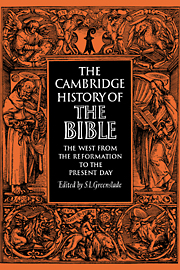Book contents
- Frontmatter
- Chapter I The Bible in the Reformation
- Chapter II Biblical Scholarship: Editions and Commentaries
- Chapter III Continental Versions to c. 1600
- Chapter IV English Versions of the Bible, 1525–1611
- Chapter V The Religion of Protestants
- Chapter VI The Bible in the Roman Catholic Church from Trent to the Present Day
- Chapter VII The Criticism and Theological Use of the Bible, 1700–1950
- Chapter VIII The Rise of Modern Biblical Scholarship and Recent Discussion of the Authority of the Bible
- Chapter IX Continental Versions from c. 1600 to the Present Day
- Chapter X English Versions since 1611
- Chapter XI The Bible and the Missionary
- Chapter XII The Printed Bible
- Chapter XIII Epilogue
- Appendices
- Bibliography
- Notes on the Plates
- Index
- Plate Section
Appendices
Published online by Cambridge University Press: 28 March 2008
- Frontmatter
- Chapter I The Bible in the Reformation
- Chapter II Biblical Scholarship: Editions and Commentaries
- Chapter III Continental Versions to c. 1600
- Chapter IV English Versions of the Bible, 1525–1611
- Chapter V The Religion of Protestants
- Chapter VI The Bible in the Roman Catholic Church from Trent to the Present Day
- Chapter VII The Criticism and Theological Use of the Bible, 1700–1950
- Chapter VIII The Rise of Modern Biblical Scholarship and Recent Discussion of the Authority of the Bible
- Chapter IX Continental Versions from c. 1600 to the Present Day
- Chapter X English Versions since 1611
- Chapter XI The Bible and the Missionary
- Chapter XII The Printed Bible
- Chapter XIII Epilogue
- Appendices
- Bibliography
- Notes on the Plates
- Index
- Plate Section
Summary
Grammar
Hebrew, Aramaic and Syriac
Interest in Hebrew grammar was anticipated by the Massoretes, whose unremitting care for the preservation of the Hebrew text and of the most delicate shades of Hebrew pronunciation issued in serious grammatical work among Jewish scholars of the tenth century (mainly concerned with Arabic). The influence of Arabic grammar is to be seen in the work of Ben Asher, the Massorete of Tiberias. His contemporary, the Gaon of Saadia (892–942) may be credited with transforming Hebrew grammar into something like a scientific discipline, and Judah ben David Hayyug, in eleventh-century Spain, put Hebrew grammar on a permanent basis, particularly by the recognition of the tri-literal root. Abraham Ibn Ezra (1092–1167) carried this grammatical knowledge from Spain to other European countries. Joseph Kimhi's grammar, Sefer Zihkaron (c. 1150), was the first exposition of Hebrew grammar in Hebrew. His son, David Kimhi (d. 1235), produced the Hebrew grammar which was to be the main source of the classical Jewish philology of the Middle Ages. Until the sixteenth century, grammatical aids to enable the Christian student to study the Hebrew text of the Old Testament hardly existed.
There is no extant Syriac grammar before the eleventh century, then that of Elias, Bishop of Tirhan (d. 049), ed. F. W. A. Baethgen (1880), and The Net of Points of Joseph bar Malkon, Bishop of Nisibis, and, most important of all, the K'taba Semhe of Barhebraeus (the Jacobite Syrian bishop bu-l-Farag, 1226–86).
- Type
- Chapter
- Information
- The Cambridge History of the Bible , pp. 520 - 535Publisher: Cambridge University PressPrint publication year: 1963

